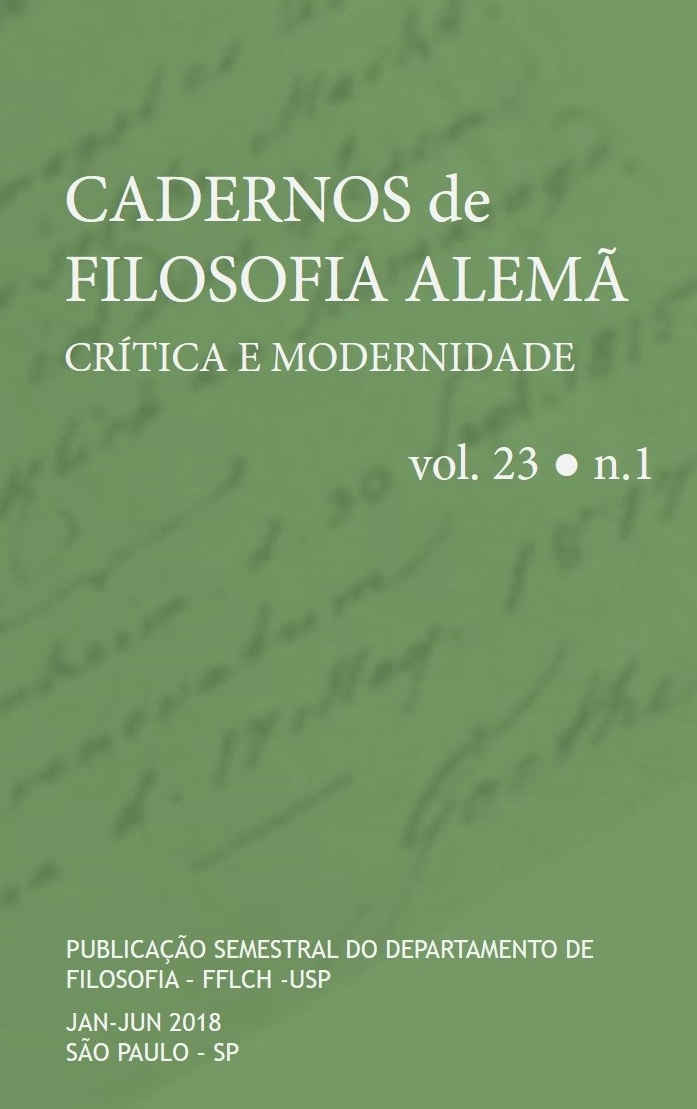What could be the role of the concept of recognition in a social theory of domination?
DOI:
https://doi.org/10.11606/issn.2318-9800.v23i1p63-78Keywords:
recognition, domination, social theory, Honneth, BourdieuAbstract
This article discusses the possible contributions of the concept of recognition to a social theory of domination. In a first step, it clarifies the meaning of the notion of social theory and it explains in which sense Honneth’s theory of recognition is a social theory. In a second step, it spells out a series of conditions that should be met by a social theory of domination. The third step raises the main issue of this article: in which respect a theory of recognition could meet these series of conditions? It is argued that in order to answer these questions, the best option is to combine some Bourdieusian insights with some Honnethian themes.Downloads
References
Adorno, T. (2008). Philosophische Elemente einer Theorie der Gesellschaft. Frankfurt am Main: Suhrkamp.
Alexander, J. (1987). Twenty Lectures: Sociological Theory since World War II. London: Hutchinson.
____________. (1988). The New Theoretical Movement. In: Smelser, N. (org). Handbook of Sociology (pp. 77-102). Newbury Park: Sage.
____________. (1999). La Réduction. Paris: Cerf.
Althusser, L. (1971). Ideology and Ideological State Apparatus. In: Lenin and Philosophy and Other Essays. New York: Monthly Review Press. [Recuperado de: www.marxists.org/reference/archive/althusser/1970/ideology.htm. Acesso em: 28 outubro 2017.]
Bourdieu, P. (2000). Pascalian Meditations. Stanford: Stanford University Press.
Burawoy, M. & Von Holt, K. (2011). Conversations with Bourdieu: The Johannesburg Moment. Johannesburg: Wits University Press.
Butler, J. (1997). The Psychic Life of Power. Stanford: Stanford University Press.
Caillé, A. & Vandengerghe, F. (2016a). Neo-classical sociology: The prospects of social theory today. European Journal of Social Theory, 16(1), pp. 3-20.
____________. (2016b). Pour une nouvelle sociologie classique. Lormont: Le bord de l’eau.
Delanty, G. (ed.). (2006). Handbook of Contemporary European Social Theory. London: Routledge.
Deranty, J-P. (2011). Travail et expérience de la domination dans le néolibéralisme. Actuel Marx, 49, pp. 73-89.
Forst, R. (2014). The Right to Justification: Elements of a Constructivist Theory of Justice. New York: Columbia University Press.
Fraser, N. (2013). A Triple Movement? Parsing the Politics of Crisis after Polanyi. New Left Review, 81, pp. 119-132.
____________. (2014). Behind Marx’s Hidden Abode. New Left Review, 86, pp. 55-83.
Gautier, C. (2007). The Renewal of Critique in Neocapitalism. Critical Horizons, 8(1), pp. 116-129.
____________. (2011). La domination en sociologie n’est-elle qu’une fiction?. Actuel Marx, 49, 2011, pp. 32-45.
Goffman, E. (1977). The Arrangement between the Sexes. Theory and Society, 4(3), pp. 301-331.
Honneth, A. (1996). The Struggle for Recognition. The Moral Grammar of Social Conflicts. Cambridge: MIT Press.
____________. (2007a [1982]). Moral Consciousness and Class Domination: Some Problems in the Analysis of Hidden Morality. In: Disrespect: The Normative Foundations of Critical Theory (chap. 4). Cambridge: Polity Press.
____________. (2007b). Recognition as Ideology. In Van Den Brink, B. & Owen, D. (eds.). Recognition and Power. Axel Honneth and the Tradition of Critical Social Theory (cap. 13). Cambridge: Cambridge University Press.
____________. (2014). Freedom’s Right. The Social Foundations of Democratic Life. New York: Columbia University Press.
International Social Theory Consortium. Recuperado de: www.socialtheory.org/index.html. Acesso em: 28 outubro 2017.
International Sociological Association. Research Committees. RC16 Sociological Theory. Recuperado de: www.isa-sociology.org/en/research-networks/research-committees/rc16-sociological-theory/. Acesso em: 28 outubro 2017.
Joas, H. & W. Knöbl. (2009). Social Theory: Twenty Introductory Lectures. Cambridge: Cambridge University Press.
Lahire, B. (2012). Monde pluriel. Penser l’unité des sciences sociales. Paris: Seuil.
Lazzeri, C. (2008). Reconnaissance spinoziste et sociologie critique. Spinoza et Bourdieu. In: Citton, Y. & Lordon, F. (orgs.). Spinoza et les sciences sociales (pp. 354-398). Paris: Amsterdam.
____________. (2012). Conflits de reconnaissance et sociologie critique. In Bankovsky, M. & Le Goff, A. Penser la reconnaissance (pp. 53-72). Paris: CNRS Èditions.
Renault, E. (2012). Adorno: de la philosophie sociale à la théorie sociale. Recherches sur la philosophie et le langage, 28, pp. 229-258.
____________. (2017). Reconnaissance, conflit, domination. Paris: CNRS Èditions.
____________. (no prelo). Théorie sociale, théorie sociologique, philosophie sociale: essai de cartographie. Sociologie.
Scott, J. (1992). Domination and the Arts of Resistance. Yale: Yale University Press.
Social Theory. About us: Social Theory Research Network. Recuperado de: www.social-theory.eu/about.html. Acesso em: 28 outubro 2017.
The Australian Sociological Association. Aims and objectives. www.tasa.org.au/thematic-groups/groups/social-theory/. Acesso em: 28 outubro 2017.
Voirol, O. (2004). Reconnaissance et méconnaissance. Sur la théorie de la violence symbolique. Information sur les Sciences sociales, 43(3), pp. 403-433.
Weber, M. (1978). Economy and Society. Los Angeles: University of California Press.
Downloads
Published
Issue
Section
License
Information and conceptions on the texts are complete responsibility of the authors.
All the articles submitted before July 5th 2018 and those published after July 2021 are licensed under a CC BY-NC-ND license – except those published between the aforementioned dates, which are under the CC BY-NC-SA license. The permission for the translation of the material published under the license CC BY-NC-ND by third parts can be obtained with the consent of the author.
Open access policies - Diadorim
Rules applied before July 5th 2018:
Presenting a submission to our Editorial Board implies granting priority of publication for “Cadernos de filosofia alemã”, as well as transferring the copyright of texts (once published), which will be reproduced only with the manifest authorization of the editors. Authors keep the right to reuse the texts published in future editions of their work, without paying any fees to "Cadernos”. We will not grant the permission to re-edit or translate the texts for third parts without agreement of the author.


